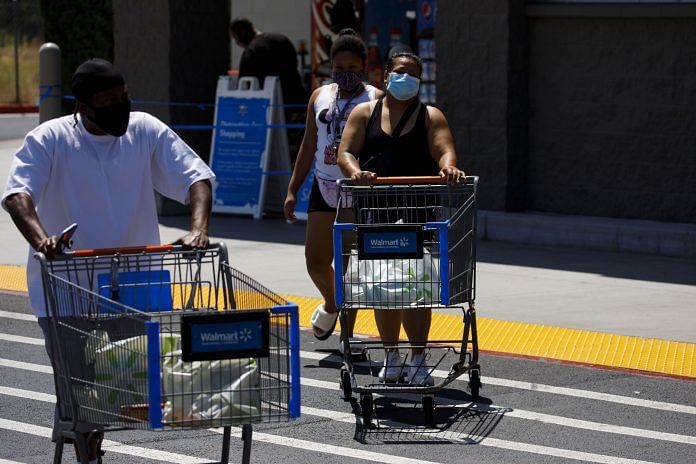The vaccinated can now go maskless. (Mostly.) Some people are looking with horror at this new recommendation from the Centers for Disease Control, while others are reacting with relief. The scientific evidence is pretty clear: There’s powerful data showing that vaccines prevent not just symptomatic Covid-19, but also curb the spread of the virus.
Some of the fearful reactions might be driven by people getting stuck on earlier reports that the clinical trials didn’t do enough to test whether the vaccines cut down on transmission. But a lot has changed since then.
Pfizer gathered all kinds of real-world data from much larger groups than they studied in the clinical trials, including U.S. healthcare workers and the country of Israel. Those data show that the Pfizer vaccine is preventing transmission. Israel’s infection wave — with thousands of cases a day — has now been reduced to a trickle, even though children and some fraction of adults remain unvaccinated. It’s reasonable to assume that the nearly identical Moderna vaccine will perform as well. The Johnson & Johnson vaccine, which hasn’t been used as extensively in the U.S., wasn’t demonstrated to reduce asymptomatic cases the same way, and scientists are still trying to understand the implications of an outbreak among the New York Yankees after most of the players got the single-dose vaccine. So far, there was one mild case and seven without symptoms.
The bottom line: the evidence that vaccines protect others is of a stronger and more direct kind than the evidence that masks do. So if you want to protect others, getting vaccinated is more likely to help than wearing a mask — and of course people are still welcome to do both.
The burden of proof is higher with vaccines than with masks. With masks, there was an abrupt turnaround last spring when experts began recommending masking without any new, definitive study. Experts I interviewed back then cited the recognition that masks were relatively safe, cheap and harmless, and therefore, if there’s some chance they might help, they should be adopted.
There were studies that offered indirect evidence, including ones done in medical facilities with health care workers adopting high quality, tight-fitting N95 masks. And there were simulations showing that cloth masks blocked some of the particles that carry the virus.
Last fall the press touted a paper that projected 130,000 lives would be saved by universal masking — but the math was based on the assumption that medical masks and cloth ones would work equally well, preventing about 40% of cases.
Another assumption — one that was probably wrong — concerned the half of Americans surveyed at the time who said they didn’t wear a mask every time they left the house. The assumption was that these people were failing to wear them in situations where transmission was possible. But it’s a lot more likely that many such people were just walking their dogs, jogging or hiking, and still masking in stores or taxis or at the doctor’s office. Scientists have been saying for months that masking alone outdoors is not likely to save anyone — something mainstream media outlets like New York Times took much longer to admit to.
Vaccines have faced a much more stringent level of scrutiny. As FDA requires for any new drug or vaccine, the burden of proof is on the vaccine makers to demonstrate they work and won’t cause harm. The clinical data that Pfizer, Moderna and Johnson & Johnson have gathered are high quality studies that show vaccines protect against symptomatic disease.
There was also limited data from the Moderna and Pfizer clinical trials showing a drop in transmission, and, later, better real-world data showing the same thing in a study of U.S. health care workers. Even stronger data out of Israel has shown that the Pfizer vaccines cut down on both symptomatic and asymptomatic cases by more than 89%. This may not sound like a good enough number to take off your mask, but experts say that these few breakthrough cases are also much less likely to transmit to others since the vaccines cuts down on the virus particles that people harbor in their noses.
Importantly, this also doesn’t mean that you have an 11% chance of getting Covid if you’re vaccinated; that’s not how the math works. That’s one reason that in the U.S., where the 95% effective Pfizer and Moderna vaccines are widely used, the real-world “breakthrough” infection rate has been a fraction of a percent.
Sure, the new recommendations are hard to enforce since unvaccinated people might “cheat” — but worries about this are based on an overestimate of the risks unmasked people pose to others, and an underestimate of the benefits of the vaccine. The big risk unmasked, unvaccinated people are posing is to themselves.
The cautious are welcome to keep wearing masks to add an additional safety net, but given the choice, getting vaccinated offers much better protection — for others as well as yourself. –Bloomberg
Also read: Clean, sanitise, refrigerate, wait — a day in the life of a morgue worker at Delhi’s MAMC



